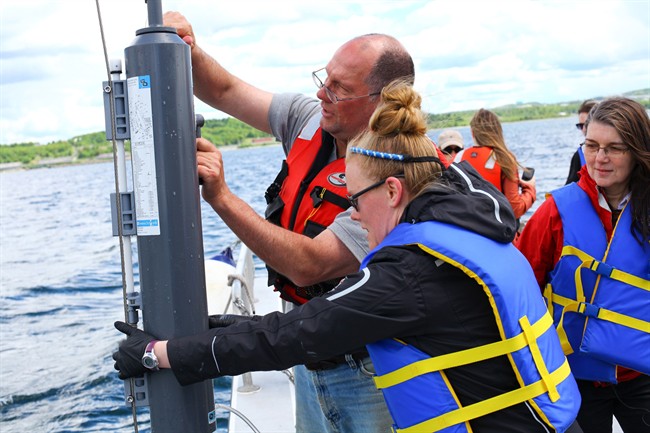HALIFAX – Canadian researchers are taking part in a global project that aims to unlock the secrets of the ocean’s tiniest helpers.

Invisible to the naked eye, microbes include small but mighty bacteria, viruses and algae that scientists say are vital to the sea and beyond.
“They’re basically the little engines behind why the world is ticking,” says Julie LaRoche, a biology professor at Dalhousie University in Halifax and Canada research chair in marine microbial genomics and biogeochemistry.
“When you think of bacteria, you always think about (how) bacteria make you sick, they make your food spoil, but most bacteria are really good for the environment. They have a very specific function, they recycle the nutrients in the soil or in the ocean.
“Also, a lot of bacteria can do photosynthesis … and they’re at the base of the food chain, so they produce all the food that the fish will eat eventually.”
LaRoche is among the researchers taking part in Ocean Sampling Day, a worldwide effort that will see ocean water containing millions of microbes collected on Saturday — the summer solstice — from more than 100 sites around the world, including three in Canada.
Dalhousie spokeswoman Nikki Comeau says researchers from universities in Canada and the United States will also take samples from sites in Manitoba and Nunavut. She says the overall project is being co-ordinated by Jacobs University in Germany and the University of Oxford in the U.K.
Once collected and analyzed, the data will be available online and mapped so that microbes can be identified in all corners of the world.
- High benzene levels detected near Ontario First Nation for weeks, residents report sickness
- Ontario takes action against chemical plant after Aamjiwnaang First Nation residents fell ill
- Enter at your own risk: New home security camera aims paintballs at intruders
- Beijing orders Apple to pull WhatsApp, Threads from its China app store
“The idea is to collect a baseline of all the microbial diversity that’s actually present right now in the ocean … but the part that we don’t see because the microbes are so small,” says LaRoche.
“It’s not something you think about every day, but they’re there and they’re really important in balancing everything.”
LaRoche and her team collected their samples Friday from different depths of the Bedford Basin in the northwestern end of Halifax harbour, from the water’s surface to the bottom.
The nutrient-rich Bedford Basin is an ideal spot to collect samples because it shares similar characteristics with deeper waters off the Scotian Shelf, she added.
LaRoche said the samples taken will be filtered and the DNA extracted and sequenced.
“It’s really hard to construct what genes belong to what bacteria, but we’re getting really a lot better at doing these kinds of analysis now,” she says.



Comments